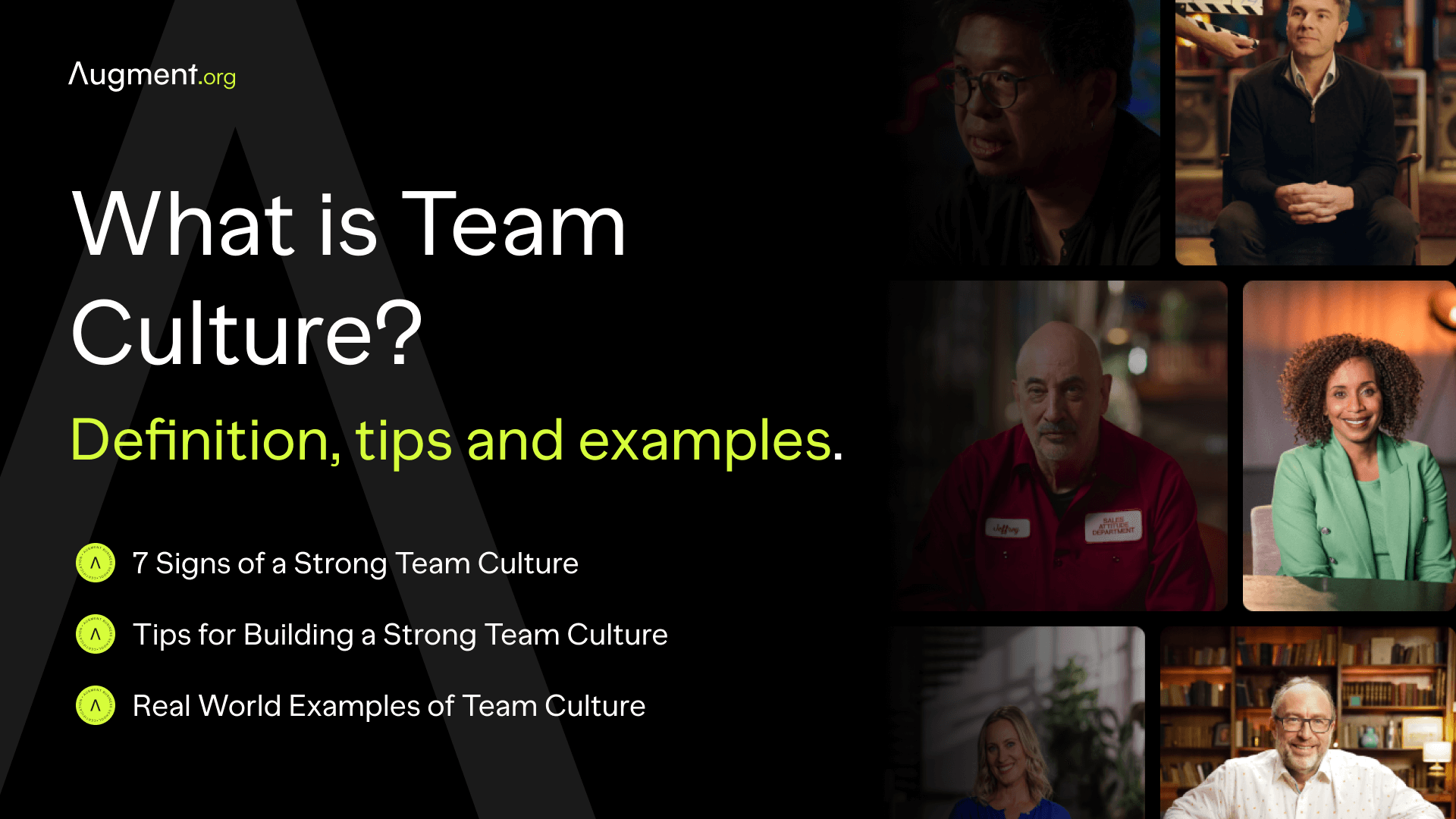What is Team Culture? Definition, Tips, and Examples
Team culture shapes how team members interact, collaborate, and achieve goals together. It influences everything from employee engagement to overall team performance. Learn about team culture and how to cultivate a strong, positive environment within your organization.

What is Team Culture?
Team culture is the collective personality of an organization. It's a blend of shared values, beliefs, and practices that team members bring to their daily work. This culture affects how team members interact, make decisions, and approach their roles within the team. A strong team culture fosters a sense of belonging and motivation, making it essential for a productive and positive workplace.
At the core of every great team culture are values that define the team's identity and guide its actions. These values shape the team's culture, influencing everything from how team members communicate to how they support one another. In a healthy team culture, each team member feels valued and empowered, contributing to the overall success and professional development of the group.
Effective team cultures also focus on employee engagement and psychological safety, ensuring that individual team members feel secure in expressing their ideas and concerns. This creates an environment where open communication and mutual support thrive, driving the team towards its goals. Organizational leadership plays a crucial role in establishing and maintaining this positive team culture.
Why is Team Culture Important?
The importance of team culture cannot be overstated. It's the heartbeat of every organization, influencing how team members feel about their work and interact with each other. A positive team culture boosts employee engagement, fostering an environment where team members are motivated and committed to achieving the team's goals.
In workplaces with a strong team culture, you'll find higher levels of job satisfaction and productivity. This is because a good team culture creates a sense of belonging, where team members feel valued and understood. It also promotes psychological safety, allowing individuals to share ideas and concerns without fear, which is crucial for innovation and problem-solving.
It's also a significant factor in retaining top talent. When team members are part of a healthy, supportive culture, they're more likely to stay with the company, reducing turnover and the costs associated with recruiting and training new employees. This stability contributes to a more experienced and cohesive team, enhancing overall team performance.
7 Signs of a Strong Team Culture
Recognizing a strong team culture is key to understanding its impact on a company's success. Here are some telltale signs:
- High Levels of Employee Engagement: In a strong team culture, team members are actively engaged in their work. They show enthusiasm and commitment, contributing not just with their skills but also with positive energy and ideas.
- Effective Communication: Open and honest communication is a hallmark of a great team culture. Team members feel comfortable sharing their thoughts and actively listen to each other, fostering mutual respect and understanding.
- Shared Vision and Goals: Teams with a strong culture work towards common objectives. They understand and align with the company's mission, and every team member is aware of how their role contributes to the bigger picture.
- Trust and Psychological Safety: Trust is fundamental in a healthy team culture. Team members feel safe to take risks, make mistakes, and be their authentic selves without fear of judgment or retribution.
- Recognition and Appreciation: A positive team culture is one where team members feel valued. Regular recognition of efforts and celebrating successes, big or small, are common practices.
- Adaptability and Resilience: Teams with a robust culture are adaptable to change and challenges. They view obstacles as opportunities to grow and learn, showing resilience in the face of adversity.
- Collaboration and Teamwork: In a strong team culture, collaboration is natural. Team members work together effectively, valuing each other’s input and leveraging diverse perspectives to achieve better outcomes.
These indicators not only reflect a thriving team environment but also contribute to the overall health and success of the organization. A strong team culture is about more than just working together; it's about building a community that supports and enhances the personal and professional development of every team member.
Tips for Building a Strong Team Culture
Creating a strong team culture is essential for any organization aiming for success. Here are some effective strategies to help build and maintain a healthy team culture:
1. Define and Communicate Core Values
Establishing and consistently communicating core values is crucial in building a strong team culture. Core values are the fundamental beliefs that guide the behaviors and decisions within an organization. They serve as the bedrock for creating a positive team culture that aligns with the company's mission.
- Identify Key Values: Start by identifying values that resonate with your team's goals and vision. These values should reflect what your team stands for and aspires to be. Common examples include integrity, teamwork, innovation, and respect.
- Involve the Whole Team: Engage team members in the process of defining these values. This inclusive approach ensures that the values resonate with everyone and are more likely to be embraced.
- Integrate Values into Daily Operations: Once defined, these core values should be woven into the fabric of your organization. This includes integrating them into decision-making processes, conflict resolution strategies, and even in how team members interact with each other and clients.
- Consistent Communication: Regularly communicate and reinforce these values through team meetings, internal communications, and training programs. This constant reinforcement helps keep these values top-of-mind for every team member.
- Lead by Example: Leadership plays a pivotal role in embedding these values into the team culture. Great leaders not only talk about these values but also demonstrate them through their actions and decisions. This sets a powerful example for the team.
2. Foster Open Communication
Open communication is a cornerstone of a strong, positive team culture. It's about creating an environment where team members feel comfortable sharing their ideas and concerns without fear of judgment. This openness leads to a more collaborative and effective team culture, enhancing overall organizational culture.
- Encourage Regular Dialogue: Encourage team members to speak openly in meetings and informal settings. Leaders should focus on actively listening and providing constructive feedback, creating a supportive environment for open dialogue.
- Create Safe Communication Channels: Establish various channels where team members can express their thoughts. This could include regular team meetings, suggestion boxes, or digital platforms. The goal is to make communication accessible and comfortable for everyone.
- Promote Positive Attitude Towards Feedback: Cultivate a culture where feedback is seen as an opportunity for personal growth and improving team culture. This includes both giving and receiving feedback constructively.
- Train Leaders and Managers: Offer training programs to leaders and managers on effective communication and leadership styles. Great leaders are key in fostering an open and collaborative culture.
3. Promote Collaboration and Teamwork
Collaboration and teamwork are essential ingredients for a winning team culture. They encourage team members to work together, harnessing their collective strengths for better problem-solving and innovation.
- Encourage Team Projects: Create opportunities for team members to collaborate on projects. This not only helps build a strong team but also fosters a sense of unity and shared purpose.
- Diverse Teams for Diverse Perspectives: Assemble teams with diverse backgrounds and skills. This variety brings different perspectives to the table, enhancing creativity and problem-solving within a collaborative team culture.
- Team Values and Goals Alignment: Ensure that all team members understand and align with the team's values and goals. This shared understanding is crucial in driving a cohesive and effective team culture.
- Create a Supportive Environment: Encourage an organizational culture where team members feel supported and know that their contributions are valued. This includes offering help, resources, and encouragement to one another.
- Foster Open Communication: Promote open and honest communication as part of the company's culture. This allows team members to express their ideas freely, leading to innovative solutions and a more inclusive team culture.
- Team-Building Activities: Regular team-building activities can strengthen relationships and improve team dynamics. These activities can be both work-related and social, helping team members to bond and understand each other better.
4. Invest in Personal and Professional Development
Investing in the personal and professional development of team members is a key element in building a great team culture. Providing growth opportunities not only enhances individual skills but also strengthens the entire team.
- Offer Training Programs: Implement training programs that cater to both the professional and personal development needs of your team members. This could range from technical skill enhancement to soft skills like communication and leadership.
- Mentoring and Coaching: Establish mentoring programs where less experienced team members can learn from seasoned professionals. This not only helps in skill transfer but also fosters a supportive and collaborative team culture.
- Encourage Continuous Learning: Promote a culture where continuous learning is valued. Encourage team members to stay updated with the latest industry trends and skills, which can be beneficial for the team's overall performance.
- Support Work-Life Balance: Recognize the importance of personal lives in professional development. Encourage a healthy work-life balance to ensure team members are well-rested and can fully engage at work.
- Provide Opportunities for Career Advancement: Show team members that there is a path for growth within the organization. This could include promotions, role changes, or even leading new projects.
5. Regularly Assess and Improve
Maintaining a great team culture is an ongoing process that requires regular assessment and a willingness to adapt. A dynamic team culture is key to staying competitive and meeting the evolving needs of both the team and the organization.
- Conduct Regular Surveys: Use surveys to gather feedback from team members about the prevailing culture. This can provide insights into areas that are working well and those that need improvement.
- Hold Team Discussions: Regular team meetings dedicated to discussing team culture can be invaluable. Encourage open dialogue where team members can share their experiences and suggestions for improvement.
- Review Team Goals and Values: Regularly revisit the team's goals and values to ensure they are still aligned with the organization's mission and the team's evolving dynamics. This helps in maintaining a relevant and effective team culture.
- Leadership Involvement: Leadership should be actively involved in this process, demonstrating a commitment to fostering a positive culture. Their focus and leadership style can have a huge influence on the team's environment.
- Identify and Address Issues Promptly: Be proactive in identifying and addressing any issues that could lead to a toxic work environment. This includes conflicts, communication breakdowns, or any other factors that negatively impact team culture.
- Celebrate Improvements and Successes: When improvements are made or milestones are reached, celebrate these as a team. This not only boosts morale but also reinforces the importance of a positive and evolving team culture.
- Continuous Learning and Adaptation: Encourage a culture of continuous learning where feedback is used to make positive changes. This helps in building a resilient and high performing team.
Real World Examples of Team Culture
Here are three real-world examples of organizations with exemplary team cultures, highlighting how they achieved and maintained these cultures:
- IDOC (Independent Doctors of Optometric Care):
- Challenges and Actions: IDOC, a healthcare company in Connecticut, faced challenges in recruiting talent due to its relatively unknown employer brand. Despite these challenges, IDOC remained committed to its people and core values, especially during the COVID-19 pandemic. They avoided layoffs and maintained high employee engagement.
- Strategic Changes: In response to the social issues highlighted in 2020, IDOC diversified its board, reflecting its core values of “people first, always” and “better together.”
- Outcomes: The pursuit of Great Place To Work Certification™ significantly enhanced IDOC's visibility as an employer. They nearly doubled their employee base and established themselves as an employer of choice, attracting talent from larger organizations. The Certification was crucial for many new hires who sought a company with a strong and positive culture.
- Bestop (Jeep and Truck Accessories):
- Challenges and Actions: Colorado-based Bestop, experiencing significant growth and changes, took steps to ensure their company culture remained strong. CEO John Larson sensed a subtle change in the company vibe and initiated efforts to understand employees' connection to the brand.
- Strategic Changes: They used Great Place To Work's detailed Trust Index Survey Results to pinpoint issues and improve internal communications. The survey results, which were shared transparently with all employees, showed high satisfaction and provided actionable insights for further improvements.
- Outcomes: The survey results led to immediate changes, such as clarifying policies around career development opportunities. Bestop's Certification and the subsequent brand development helped them position themselves as an employer that values its employees, which had a positive impact on their recruitment and brand perception.
- Blue Cross and Blue Shield North Carolina (Blue Cross NC):
- Challenges and Actions: In 2018, Blue Cross NC decided to transform its culture, focusing on aligning the company with new values centered around people and culture.
- Strategic Changes: Utilizing the Emprising platform from Great Place To Work, they gathered detailed data on their company culture, allowing managers to understand and improve their teams' experiences. A key focus was on increasing meaningful conversations within the organization.
- Outcomes: The emphasis on meaningful conversations led to significant improvements in employee experience. Managers were empowered with data to make culture-driven decisions, leading to a culture where employees felt more connected and engaged. This data-driven approach helped the company exceed its culture goals and maintain a vibrant, healthy work environment.



